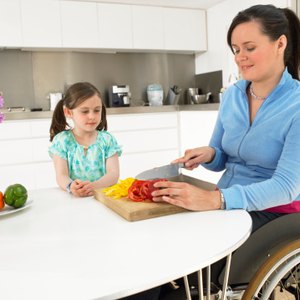
Supplemental Security Income (SSI) benefits are usually available to older people or people with disabilities who have very little income. The needs-based program will enable you to access cash that you can then use to pay for shelter, food, and clothing. If you are an unwed mother with disabilities or your child is disabled, you may be able to access these benefits.
SSI Benefits Eligibility Criteria
The eligibility criteria for SSI benefits vary depending on whether an adult or child will access them. So, you must learn the difference.
1. SSI Benefits Criteria for Adults
SSI benefits are based on individual needs, and thus, cannot be passed on to another person. For a disabled mother, the SSI general eligibility criteria are as follows:
- It would help if you were elderly and 65 years or older with few resources and low income or
- You must be blind with few resources and low income or
- You should have a disability with few resources and low income.
Other criteria are as follows:
- You must be a citizen of the U.S. or a legal alien. If there is an active warrant for deportation, you don’t qualify for SSI benefits.
- You should not be confined to any institution at the government’s expense. For example, you should not be in prison.
- You should have a central visual acuity for a distance of 20/200 or less in your better eye or a visual field limitation in your better eye.
- Your disability should have continuously lasted or is expected to last for at least 12 months and may result in death.
- You should be unable to engage in any gainful activity.
But what SSI considers as a resource is not what other institutions may consider as a resource. If you are an unwed mother, SSI requires that your countable resources be less than $2,000 since you are single. These resources may be in the form of bank accounts, stocks, property and bonds.
However, the home you live in and the land it is built on do not count. Neither does your primary vehicle if your family uses it for transportation, nor your goods and effects.
2. SSI Benefits Criteria for Children
SSI benefits criteria for children are a bit different. Some of them include the following:
- A child eligible for SSI benefits must be either under 18 or under 22 and attending school, which SSA must get proof of. And they must not be the head of the household or married.
- For your child to access SSI benefits, they must be blind or disabled.
- Your disabled or blind child could begin accessing SSI benefits from birth and until they reach 18 years.
- Once your child reaches 18 years, SSA will reevaluate their needs based on what qualifies as an adult disability.
- If your child is blind, they could access SSI benefits for the blind if they meet the set criteria that determine blindness.
- The visual impairment criteria apply to children too.
- Your child’s disability should have resulted in marked and severe functional limitations for 12 continuous months. Alternatively, if you expect the disability to last for that period, your child also qualifies for SSI benefits.
It is also worth noting that the state agency may ask you for proof of your child’s disability. However, it will pay for the medical examination. If you are a struggling unwed mother, you don’t need to worry about the added expense.
How Much SSI Will You Get?
The federal SSI benefits are capped at a maximum of $794 per month for individuals. When getting these benefits for yourself or on behalf of your child, that is the most you are likely to get for every person that qualifies.
However, if you get any, your countable income will influence the final amount of SSI benefits you are likely to get each month. The more your countable resources are, the fewer your SSI benefits will be.
Therefore, if you live in a Medicaid institution, you will only get $30 each month. And if you live in the household of someone else, your maximum benefits will be $529.34. However, you can earn up to $1,655 and still access some of your SSI benefits.
SSI benefits mothers with disabilities or disabled children to a point if they are unwed. But you must meet its strict eligibility criteria or have a child that meets these criteria to get the benefits. So, bear them in mind.
References
- APP: Can single mom’s daughter get SSI benefits?
- SSA.Gov: Supplemental Security Income (SSI)
- SSA.Gov: What Are Resources?
- SSA.Gov: Supplemental Security Income (SSI) Eligibility Requirements
- SSA.Gov: Supplemental Security Income (SSI) For Children
- SSA.Gov: Supplemental Security Income (SSI) for Children
- SSA.Gov: SSI Federal Payment Amounts for 2021
- NOLO: Income Limits & SSI Disability Eligibility
- SSA.Gov: SSI Monthly Federal Benefit Rates (FBRs) And Living Arrangements
Writer Bio
I hold a BS in Computer Science and have been a freelance writer since 2011. When I am not writing, I enjoy reading, watching cooking and lifestyle shows, and fantasizing about world travels.

